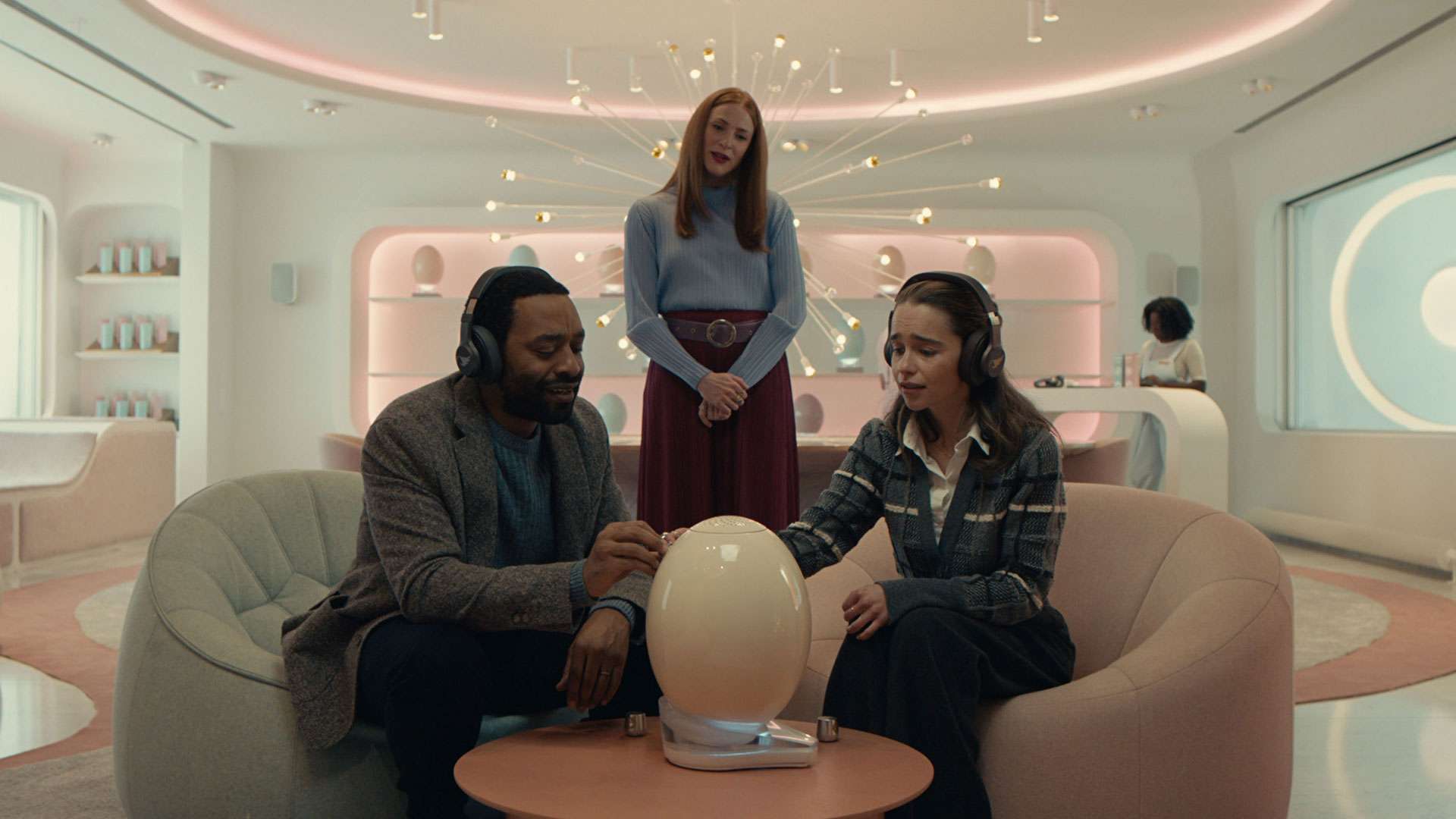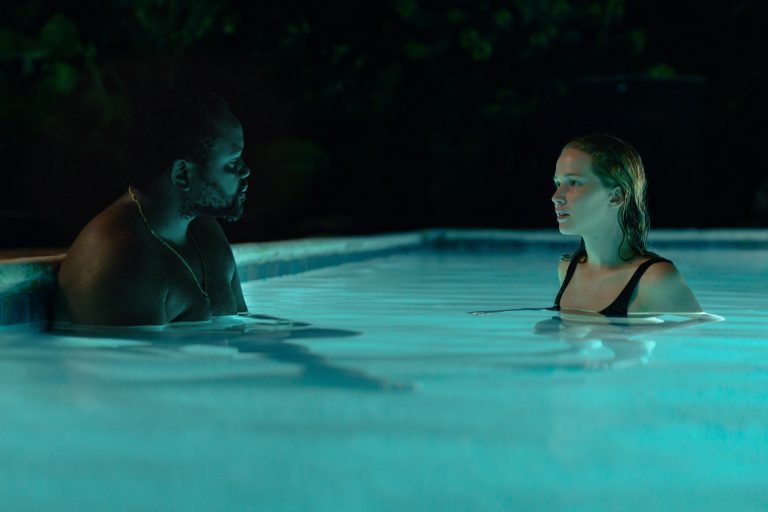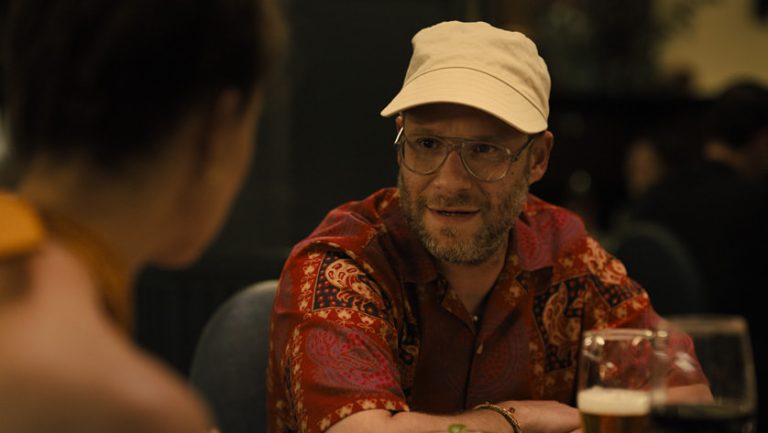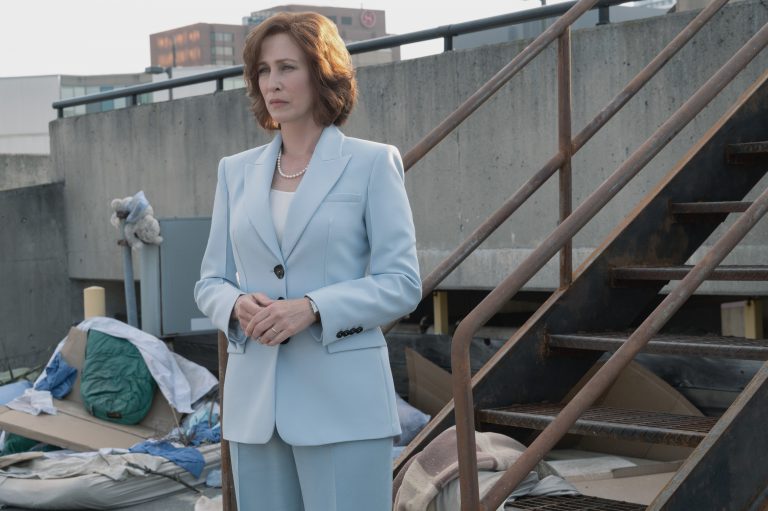When we delve into the realm of a futuristic setting, two words immediately come to mind: ‘utopia’ and ‘dystopia.’ While ‘utopia’ denotes an imaginary place or state of perfection, ‘dystopia’ stands in stark contrast, riddled with imperfections. It’s fascinating to observe that even in envisioning the future, we encounter echoes of our current reality. Sophie Barthes’ new futuristic science fiction film, The Pod Generation, grapples with the same crises we face today: the rise of AI, the corporate takeover, the commodification of life, and the social isolation caused by technology.
It cleverly satirizes life in a world shaped by these forces. Emilia Clarke and Chiwetel Ejiofor lead the film, deftly portraying both the utopian and dystopian facets with sharp wit. Although the screenplay meanders at times, delving too deeply into criticism of the situation, affecting the film’s pacing, especially towards the end, the director retains the core narrative thread.
This article aims to provide a more detailed discussion of the film. Readers are advised to proceed with caution, as spoilers lie ahead.
The Pod Generation (2023) Plot Summary & Movie Synopsis:
Set in the not-so-distant future amidst the bustling backdrop of New York City, The Pod Generation introduces us to the central character, Rachel, ensconced in a tranquil dream where she envisions herself embracing motherhood. However, her reality starkly contrasts this idyllic reverie, as the demands of her hectic life leave no room for the rigors of traditional pregnancy. Despite Rachel and her husband, Alvy, sharing a fervent desire to become parents, their world is firmly under the sway of artificial intelligence. Personal AI voice assistants expertly choreograph daily routines, and indoor artificial nature pods seamlessly replace genuine outdoor experiences.
Rachel is a dedicated and accomplished employee at Pegazus, a prominent tech conglomerate, and her unwavering commitment soon earns her a well-deserved promotion. This promotion comes with an intriguing offer: The company offers to bear the substantial expenses of childbirth through the innovative services of the Womb Center, a subsidiary of Pegazus, should Rachel choose to embrace this extraordinary opportunity.
The Womb Center stands as a cutting-edge research institution in the United States under the ownership and stewardship of the tech giant Pegazus. Their overarching goal is to counter the global decline in birth rates due to the immense physical and emotional tolls traditionally associated with childbirth. This decline threatens global population stability. To alleviate this strain on prospective parents, particularly women, the Womb Center devised a groundbreaking technology: the detachable remote womb.
It resembles a sizable, egg-shaped chamber replicating a human womb’s conditions and vital functions. Beginning with the parents’ reproductive cells, the embryo undergoes its initial formation through a natural process, albeit within a laboratory setting. Subsequently, the embryo finds its home within the detachable womb, where it continues to develop. This artificial pod primarily resides at the Womb Center facility, with parents having the privilege of occasional visits and limited custody periods to foster their connection with their future child.
Nurturing and sustenance are handled through technological means, as specially prepared food is dispensed via a tray directly linked to the pod. A software application enables the introduction of specific sounds and experiences to promote the embryo’s development. The narrative hints at the prospect of genetic modification, as embryos can be treated for hereditary diseases during their early stages. However, this entire process comes at a substantial cost and is in high demand among the masses, limiting access to only a fortunate few.
Upon receiving the offer from her company to cover the substantial expenses of the program, Rachel is overwhelmed. This opportunity presents an enticing chance, especially when she receives the long-awaited news from the Womb Center confirming her acceptance into their revolutionary artificial womb program.
As a dedicated professional with minimal time to spare for conventional childbirth, Rachel eagerly seizes this opportunity. The only obstacle in her path is her husband, Alvy, who ardently cherishes a life untainted by technological interventions. Subsequently, Rachel embarks on a quest to make this momentous decision and find a way to bring Alvy on board with her choice.
Throughout The Pod Generation, Rachel and Alvy, as a couple, grapple with profound differences rooted in their contrasting attitudes toward technology. Rachel’s immersion in the tech-centric environment of Pegazus makes her more amenable to technological advancements, even to the extent of forgoing artificial nature pods to allocate more time to her work. Consequently, she readily embraces the idea of childbirth aided by a detachable womb pod, viewing it as a practical solution and a testament to human progress.
Alvy, however, adheres staunchly to his own beliefs, apparent in his profession and lifestyle. In a world where technology has taken over even the most basic aspects of daily life, Alvy stands out as a botanist who advocates for a return to nature. He resists the allure of artificial nature pods and treasures his suburban house for its respite from the technological chaos of the city. His mornings are dedicated to nurturing real plants and trees, a rarity in this technologically driven world.

As a botany professor, he passionately encourages his students to forge genuine, emotional connections with nature, particularly trees and laments the growing disconnect between younger generations and the natural world. Given his deep-rooted convictions, Alvy vehemently opposes the use of detachable wombs to usher in their child’s birth.
Upon learning of Rachel’s enrollment in the Womb Center program, Alvy is taken aback by her unilateral decision to pursue this unconventional path to parenthood. Beyond the rift in their understanding, Alvy is deeply troubled by the prospect of altering the natural course of childbirth, a process he regards as sacrosanct.
He scrutinizes the intricate processes involved in nurturing their baby within the egg-shaped artificial womb and maintains a steadfast stance against it. Despite the efforts of Rachel’s friends and even her AI therapist, Alvy remains unyielding in his resistance. Nevertheless, his love for Rachel and her unwavering desire to have a child ultimately leads him to reluctantly agree to proceed with the pod-based childbirth.
As the embryo begins its development within the pod and Rachel becomes increasingly overwhelmed by the process, Alvy’s initial skepticism gives way to a gradual transformation. His interaction with the pod becomes more involved, partly due to Rachel’s growing distance from the experience. Rachel’s strange dreams and nightmares, integral to the process, intensify her disconnect from the embryo, prompting her to seek a deeper bond by bringing the pod to her workplace—an action discouraged by her superiors. This exposes the corporate hypocrisy surrounding the program, with Rachel eventually turning to an AI therapist for clarity.
Alvy’s evolution in perspective unfolds as he assumes a more prominent role in tending to the pod’s needs, gradually shifting from skepticism to affection. He begins wearing the pod around his waist and, at times, even carries it to work. While he retains his devotion to natural principles, Alvy regards the pod as his child, nurturing it with love and care. This transformation subverts traditional gender roles, with Alvy embracing parenthood with an open heart and an open mind.
The Pod Generation (2023) Movie Ending Explained:
Does Alvy and Rachel’s Parenthood Come to Fruition?
As The Pod Generation draws to a close, Rachel and Alvy begin to harbor growing doubts and apprehensions about the Womb Center. The company alters its agreement terms in response to a rising demand for its services. The company now seeks to expedite the childbirth process, reducing it to a mere 39 weeks and swiftly emptying the pods for the next couple in line. Rachel and Alvy, deeply concerned for the well-being of their baby, become wary of this accelerated timeline. They desire to keep the pod at home and manage the birth themselves.
However, the in-charge at the Womb Center disapproves of their proposed plan. As a result, Alvy takes matters into his own hands by covertly stealing the pod from the Womb Center. Fully aware that the company will likely search for the missing pod, the couple abandons their New York home, opting for a sanctuary devoid of modern AI technology. They relocate to their Shell Island residence.
As the time for their child’s birth approaches, they realize that the Womb Center has remotely withdrawn its support, posing a threat to the baby inside. Fortunately, the imminent birth proves fortuitous, and Alvy assumes the role of a gentle and capable “midwife,” carefully breaking open the pod to bring their child into the world, mirroring the role of a doctor.
In contrast to science-fiction twists and turns, The Pod Generation’s conclusion takes on a poignant and dramatic trajectory, ultimately chronicling the journey of two devoted parents navigating the ever-evolving landscape of AI-driven times. Alvy and Rachel opt to remain at their tranquil Shell Island retreat, seeking refuge from their bustling lives and the pervasive influence of technology, choosing to nurture their child in the embrace of nature. As a final symbolic gesture, Rachel carefully packs the broken artificial pod and ships it, presumably back to the Womb Center company, signifying the end of its utility in their lives.
What does the mid-credit scene in The Pod Generation mean?
In a mid-credit scene, the film offers a glimpse of the Pegazus CEO during a television interview, making perplexing claims about the company’s intentions to allow babies to choose their parents in the future. While sounding somewhat gimmicky, this assertion carries inherent dangers, as it hints at the possibility of Pegazus integrating AI more directly into human embryos to accelerate their development beyond the norm. This tantalizing cliffhanger leaves viewers pondering the implications of such a futuristic vision.


![Room [2015]: When a Mother is your Whole World](https://79468c92.delivery.rocketcdn.me/wp-content/uploads/2015/11/enter.jpg)



